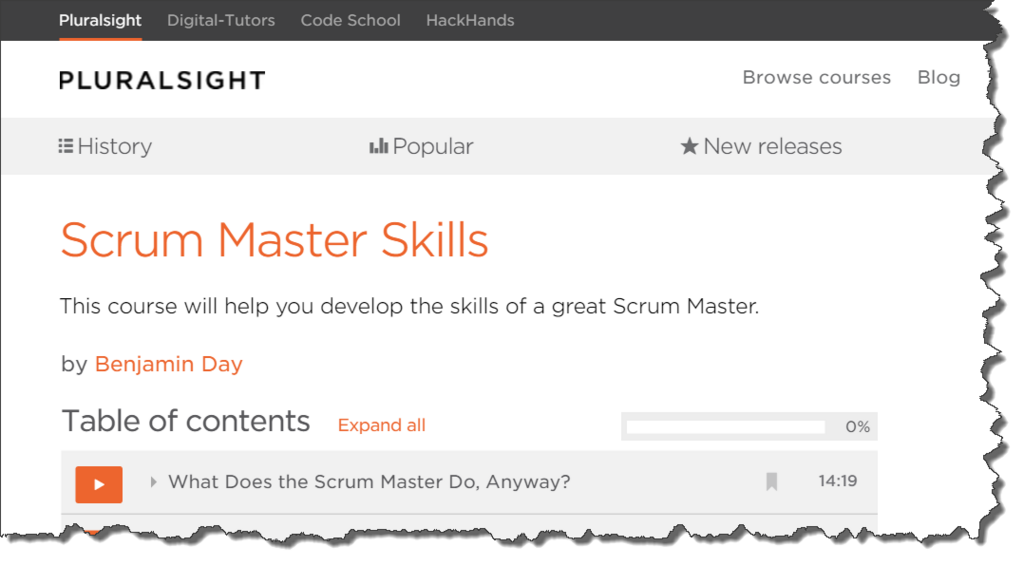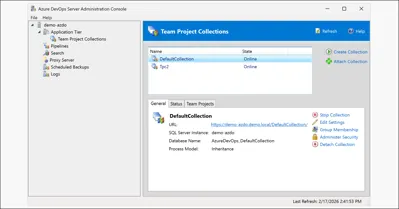My new Scrum Master Skills course just went live on Pluralsight!
Here's the course description:
The Scrum Master role in an organization can be difficult. You live between a rock and a hard place. You're influential but you probably don't have any real power. You're not a project manager but you're still kind of on the hook for delivering. You're long on responsibility and short on power. But it’s a great job, right? There's nothing like helping your team come together and deliver fantastic, done, working software.
It takes a special kind of person to be Scrum Master -- nerves of steel, a lot of finesse, and some ridiculously great people skills. It's a lot of knowing what to look for and knowing how to help fix it. Even better if you can anticipate issues and get in front of them. What can you do to help keep everything on track? How do you help your team to solve problems and really sing? This class will help you develop the skills of a great Scrum Master.
Module 1: What does the Scrum Master do anyway?
This module will provide a quick overview of Scrum and set the context of the Scrum Master’s role within the Scrum process. The focus will be on introducing the ideas of leading without controlling, coaching self-organization, the 'should's' vs. 'should nots' of the Scrum Master role, and 'Scrum vs. Agile'.
Module 2: Tighten up Your Scrum Process Many scrum teams start with the best intentions but over time lose touch with the Scrum Process. At this point, they say they're "doing Scrum" but they're just going through the motions without actually capturing the benefits. This module will discuss a set of practices to help teams to regain focus on the Scrum Process so they can have a better visibility into their workflow and be more productive.
- Definition of Done (DoD)
- Do Less
- Velocity
- A ‘Ready’ Product Backlog & Stakeholders
- Backlog Refinement Meetings
- Predicting the Future
- Estimation & Complexity
- Getting Started with Story Points
- Team-based Estimation & Planning Poker
Module 3: Better Scrum
Once your team has established a stable Scrum foundation, there are things you can use to make it better. The focus in this module will be on techniques for creating focus, combating boredom at the Daily Scrum meeting, and some tips for the Sprint Review & Retrospective.
- Create a Sprint Goal
- Your Daily Scrum Is Boring
- Daily Scrum: What’s the Point?
- Daily Scrum: It Takes Forever
- Daily Scrum: Status Reports
- Daily Scrum: Teams of One
- Daily Scrum: 3 Questions Format Stinks
- Review and Retrospective Tips
Module 4: Leadership & Communication
The Scrum Master role is a strange kind of non-leader leader. You’re in control and you’re also 100% not in control. You’re their powerless leader and also their therapist. This module discusses the mindset, leadership skills, and people skills that are helpful to a Scrum Master. Topics include: leading vs. coaching vs. commanding, designed alliances for teams, levels of listening, handling disagreement, and communicating uncertainty.
- Designed Alliances
- Less Boss, More Therapist
- How to Read Minds
- Levels of Listening
- Observe Back to the Room
- Get Curious
- Injecting Your Own Opinion
- Difficult Conversations
- Coaching Self-organization
- Commitment vs. Forecast
Module 5: Dysfunction
In Scrum, sometimes things are broken and it won't be clear why. This module will discuss some of the common dysfunctions that occur on Scrum teams, why they're bad, and what you might be able to do about them. Topics include: "disengaged product owners", fear-oriented development, technical debt, and some thoughts on organizational system coaching.
- Product Owner Dysfunctions
- Hero Developer Dysfunctions
- Changing Sprint Length Dysfunction
- People & Culture Dysfunctions
- “Voluntold” Dysfunction
- “Culture of Fear” Dysfunction
- Burnout Dysfunction
Module 6: Common Questions & Objections
If you're the Scrum Master, you're almost always the 'go to' person for questions and objections about Scrum. If you want to maintain or establish your credibility as a Scrum leader, it helps to anticipate these questions and objections and have solid, well-thought answers. Topics will include: how to discuss release management, Minimum Viable Products and PBI decomposition, budgeting, Scrum & contracts, and Emergent Architecture.
- Our PBIs Are Too Big for the Sprint
- What Happens to Undone Work?
- QA Has Nothing to Test at the Start of the Sprint
- How Do You Schedule Framework Code?
- How Do You Do Scrum on a Consulting Project?
- How Do You Do Annual Budgeting with Scrum?
Module 7: Getting Started, Agile Transformations, & Multiple Teams
Let's face it. You might not work in a company that's already doing Scrum. You or your company might see the benefits of Agile-based thinking and want or even need to move to Scrum. This process is commonly referred to as an "Agile Transformation." How do you take an organization who lives and breathes old-style Waterfall project management and get them on the path to agility? How do you take a chaotic organization with little or no process and get them on the path to agility? This module will discuss some of the skills and mindsets that you'll need to start selling and leading an Agile Transformation. Topics will include: "Why Agile?", understanding Scrum Under Waterfall, zero Process to Scrum, Kotter's Principles for Leading Change, and also how to think about multiple teams.
- What’s and Why’s of Agile & Scrum
- Getting Started with Scrum
- Scrum Under Waterfall
- Making Scrum Under Waterfall Work
- Agile Process Transformations
- Multi-team Scrum
Here's the link to the course.
Hope you like it.
Enjoy, -Ben
-- Looking for help with your Scrum process? Want some in-person Scrum training? Need a coach for your Scrum Masters or team? Drop us a line at info@benday.com.







